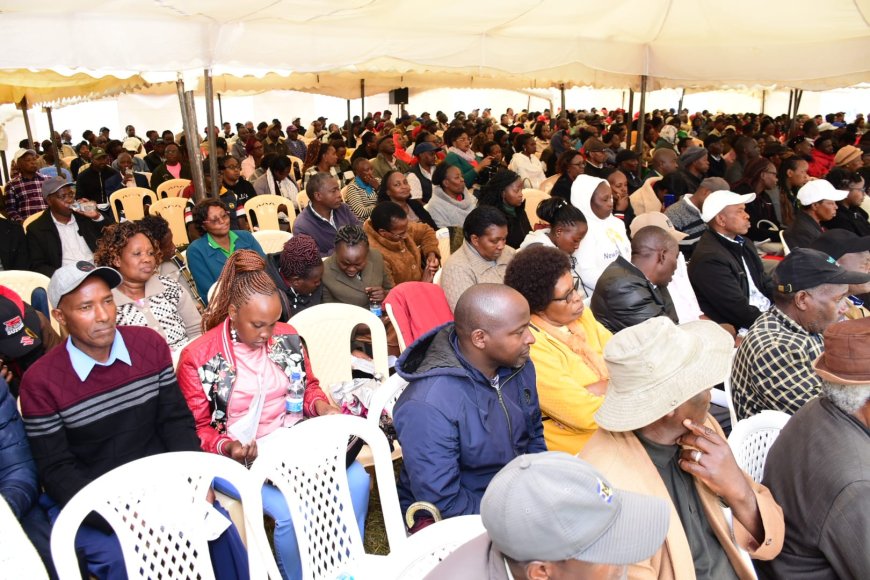Reforms in the coffee sector to benefit farmers

Uasin Gishu
Tuesday, January 16, 2024,
KNA by Ekuwam Sylvester and Angela Silayo
The Government through the Ministry of Cooperatives and Micro, Small and Medium Enterprises (MSMEs) Development is keen on bridging the difference between the producer and the consumer to ensure the highest value of coffee is transferred to the farmer.
The Cabinet Secretary for Cooperatives and MSMEs Development, Simon Chelugui pointed out that the government through Executive Order No. 1 of 2022 had plans to introduce new reforms in the coffee sector to address various challenges of production and productivity that the sector has faced for a long time.
The CS who was speaking during the launch of the Coffee Cherry Advance Revolving Fund to support farmers in Uasin Gishu, affirmed that coffee production in the country had dropped three times to 51000 metric tonnes as compared to the previous 145000 metric tonnes.
Noting that coffee farming is lucrative, he called on farmers to put more efforts into increasing its production across the country.
Chelugui indicated that the government, through the new reforms, is set to ensure farmers are well paid and promptly to improve production.
“Farmers should receive their money upon arrival of the harvest in the factory to empower farmers and enable them to be independent instead of borrowing from credit institutions to purchase farm inputs while awaiting payment,” he noted.
He further assured farmers of proper extension services working together with experts from the New Kenya Planters Cooperative Union (KPCU) and the Coffee Research Foundation to sensitize and educate farmers on better coffee farming practices.
Additionally, he called on the county administrations involved to employ enough extension officers and deploy them up to the ward level to support farmers in terms of advice.
He commended the Uasin Gishu administration for setting up a 4-acre coffee nursery at Chebororwa Agricultural Training Centre (ATC) to provide certified seedlings to farmers.
“Previous laws were not favourable to coffee farmers, we have these regulations, that is why we have a new Coffee Cooperative Bill before the national assembly and the senate. In this bill we want to reduce the gap between farmers and the consumer, we want farmers to benefit more than the middlemen,” explained CS Chelugui.
He decried the issue of coffee marketing where an individual trader possessed three licences as a miller, marketer and exporter which ruined the profitability of the crop on the side of the farmer. He added that strict regulations on licences had been put in place which has seen coffee prices go up in the Nairobi Coffee Exchange market.
“We have now decided through the regulations, that a person should have a single licence either as a miller, marketer or exporter, nobody should have multiple ones, one should conduct one activity only,” he added.
“We have seen a great increase in the price of coffee. In the last auction at Nairobi Coffee Exchange, it was 201 dollars per sack which is equivalent to over Sh 34000 per bag which works out to Sh 91 per kilo of cherry,” alluded the CS.
Regarding the issue of financing and profitability as per the new reforms to salvage the coffee sector, Chelugui alluded that they have registered about 14 farmers' unions and that the government is also keen on supporting coffee farmers in Uasin Gishu and Elgeyo Marakwet Counties to form their union and be licenced to sell their coffee in the Nairobi Coffee Exchange.
In the new regulations, farmers and marketing agencies have the right for the first time to withdraw their coffee from the market when the prices are unfavourable giving them enough time to wait until the prices stabilize.
Additionally, they will also have the right to sell up to 15 per cent of their coffee through a private treaty while the other 85 per cent goes through the Nairobi Coffee Exchange.
“We want the coffee farmers to take charge of their market and the advantage of this is when the price is low you have the right for the first time in history to withdraw your coffee until the price is favourable unlike before when farmers were forced by middlemen to sell their coffee even when the prices were down and then reselling expensively,” explained the CS.
He underscored that farmers should receive their money within 5 days selling of the coffee, through the Direct Sales Settlement (DSS), which will sort out the farmers, millers, marketers and transporters.
The Cooperatives and MSMEs Development CS challenged Coffee farmers in Uasin Gishu and Elgeyo Marakwet counties which currently have annual production of 106 metric tonnes and 94 metric tonnes respectively, to scale up their efforts to reach new targets of 1000 metric tonnes and 800 metric tonnes each as a way to boost coffee production in the country.
In his remarks, Uasin Gishu governor Jonathan Chelilim reiterated his administration’s commitment to support coffee farmers across the county in accessing certified seedlings, appropriate farm inputs, Provision of extension services, Expansion of water system to enhance intensive irrigation, in adopting the National Coffee policy and associated regulations and establishment of 1 million Coffee seedlings at Chebororwa ATC.
He lauded the initiative by the New Kenya Planters Co-operative Union in upgrading Coffee Sub-Sector adding that they are working closely with development partners to boost Coffee Sub-Sector and ensure farmers produce quality Coffee beans for local and international markets.
“My administration has made major strides in the sub-sector by supporting farmers to access Coffee seedlings, increasing the acreage under coffee from 83 acres to 1,451 acres eight years on. We have also offered them 28 motorized Coffee pullers and one Eco-Pulpier machine with a capacity of 1 ton per hour installed at Turbo Coffee Farmers’ Co-operative Society,” he noted.
Courtesy; KNA
What's Your Reaction?
































































































































































































































































































